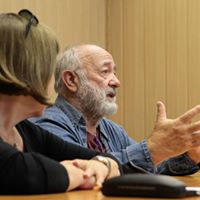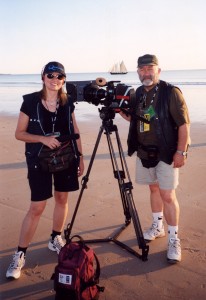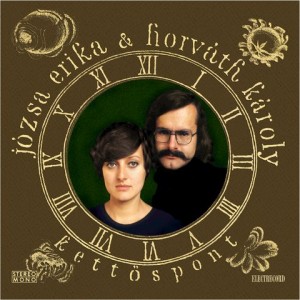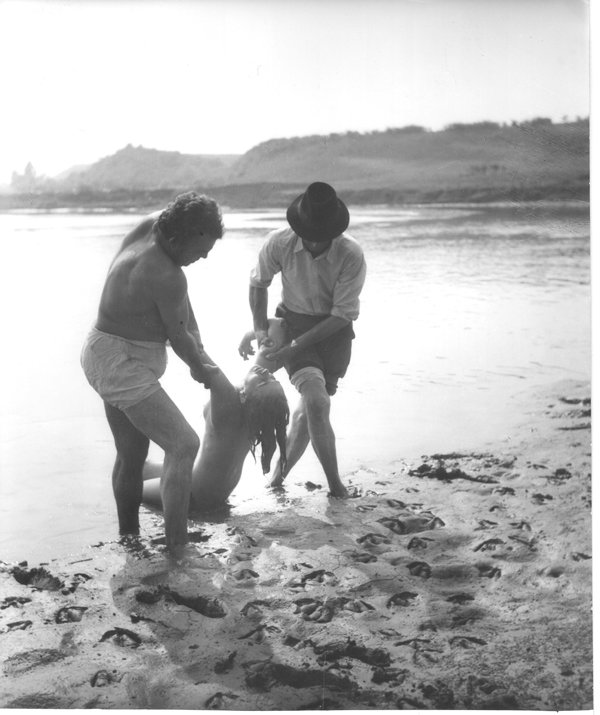Masterclass cu regizorul Iosif Demian, la Facultatea de Arte Hyperion


Erika Józsa is a journalist, information professional, author, singer-songwriter & composer. She is also known by her married name as Erika Demian. In the 70′s and 80′s she worked as a television anchor and presenter at the Romanian Television in Bucharest, composed scores for features films & theatre plays, recorded albums and toured extensively throughout Europe with her partner Károly Horváth and their band Táltos. She moved to Australia in 1986, where she continued her career as multilingual journalist, foreign correspondent for European TV stations and as multimedia and television producer in partnership with husband Josef . She also continued to play and write music and authored several books.
Josef Demian – also known as Iosif Demian & József Demian- is a well-respected, multi-award winning cinematographer, director & script writer with a long list of feature films and documentaries to his name. He is also an educator, teaching and mentoring generations of film makers towards successful careers. His masterclasses are in high demand, and his unique method of teaching is extremely popular with students.
Józsa Erika
COLON
You walk along a path of words,
each step can make a difference,
each turn can change what lies ahead,
just waiting in the distance.
Drenching you with freezing shower
angry words will test your power,
(but) shining through the clouds of darkness
still prevail the words of kindness.
Rest a while, no need to rush,
the colon gently warns you,
the meaning, that you seek to find
is somewhere waiting for you.
Rest a while, then go ahead
the colon keeps reminding,
down that long, and dusty road
the essence may be hiding.
Kettőspont (Colon) is the title of Erika’s most successful album relaunched in 2003 with the publisher’s recommendation cited below.
*****
Erika Józsa and Károly Horváth are the voice of a generation, pioneers of a musical movement born in Transylvania in the early 1970s. They have become the best known and most loved folk singers, touring extensively throughout Romania and Hungary.
Erika and Károly formed their duet in 1970. They called it CONCORDE.
Erika brought with her the earlier experience of leader, guitarist, lyricist and composer of a beat band, Károly his classical cello training, his love for medieval music and archaic folk songs.
From the fusion of these two completely different musical worlds a new, original, unmistakable and refreshing style emerged which holds its place even today amongst the wide variety of styles in contemporary Hungarian popular music.
Their music is a very successful blend of Beat, Hungarian folk music and classical music. They dare to experiment, mixing elements of different genres, using classical instruments like the violin, cello, double base and guitar together with archaic Hungarian folk instruments like the citera, or the gardon, a unique instrument of the Csángós.
Another strength — and also a first — was the extremely high standard of their lyrics. Erika was the most highly acclaimed lyricist of the time. But they also used the work of their poet friends, carefully selecting the poetry best fitting the message they intended to convey.
This album includes work by Arpád Farkas, Peter Tomory, Attila Vári, and Sándor Kányádi. Below the surface, each song holds a different, deeper, symbolic meaning for the connoisseur.
Recordeded in 1977 and published in 1978, Kettőspont was the first ever album of its genre in Romania.
Pages could be filled with all the stories connected to this achievement. Stories about each and every song born under the watchful eyes and ears of the secret police, about the fights with censorship and bureaucracy, about hardship, but above all stories of friendship, loyalty and camaraderie.
At the time only one record company existed in the country and its production was strictly controlled. Sneaking one or two Hungarian titles into its centrally approved yearly plan was an achievement in itself.
A lengthy approval process followed when every word and every musical note was strictly scrutinised. A lot of ingenuity was needed to put together a skilfully altered and sanitized translation which could pass the Romanian censorship.
Once the recordings were finalised another stage of the approval process followed. The smartest tricks were necessary to fool the audition committee: a strategically timed cough or sneezing could make or break the album.
Kettőspont means Colon. This little-appreciated punctuation mark inspired the album’s closing song, also giving it its title.
The songs follow the different stages of a human life from the cradle to the grave; then the final song sums it all up: we are travellers through time, meeting good and bad along the road.
Then a sign stops us, demands reflection: the colon is not the end, it rather signals the beginning of something else. It signals a change, something to look forward to, something better to come.
Erika and Károly are versatile musicians and play about a dozen instruments between them; but the rich arrangements required a few more invited musicians’ contribution to this album.
Sándor Dobránszky on the violin was a key member of the team; he also toured in a trio with Erika and Károly.
János Márkus plays the citera and several other instruments on this record. A successful singer-songwriter in his own right, he has become a member of Erika and Károly’s new group, Táltos RT formed around the time this album hit the stands. (The fourth member of Táltos RT was András Kovács, who played the violin).
Gyorgy Nemes made his contribution on classical guitar. He later joined Erika and Károly together with Álmos Gáspár (violinist, today member of Kormorán) and in 1980 formed the group called Táltos.
Their next album, published in 1983, continued the tradition of the highest quality music and lyrics established with Kettőspont.
Other instrumental contributions on Kettőspont were from highly acclaimed musicians like Costin Petrescu (Phoenix) percussion, Florin Ochescu (Rosu si Negru, later Iris, Holograf) electric guitar, and the string orchestra of the Bucharest Conservatorium of Music.
The album also includes two songs by the unforgettable Jozsef Babrik, a former member of the group.
Erika and Károly’s musical partnership has lasted for several decades. They went on to compose music scores for films and theatre plays. One of their more recent collaborations was a musical in 1997 in which Erika wrote the libretto and Károly the music.
Károly has become a very successful stage composer and musical director of several theatre companies, both in Romania and Hungary, where he lives today.
Erika’s main carrier path developed in television. For over a decade and a half she was the very popular presenter and reporter of the Hungarian program on Romanian Television. In 1985 she left her native country and now lives in Australia.
TVR 1 Joi, 3 Decembrie 2015 22:25

Lumea și Noi – TVR International 30 ianuarie 2015
Erika Józsa și pasiunile ei de-o viață- Un film d Doru Ionescu